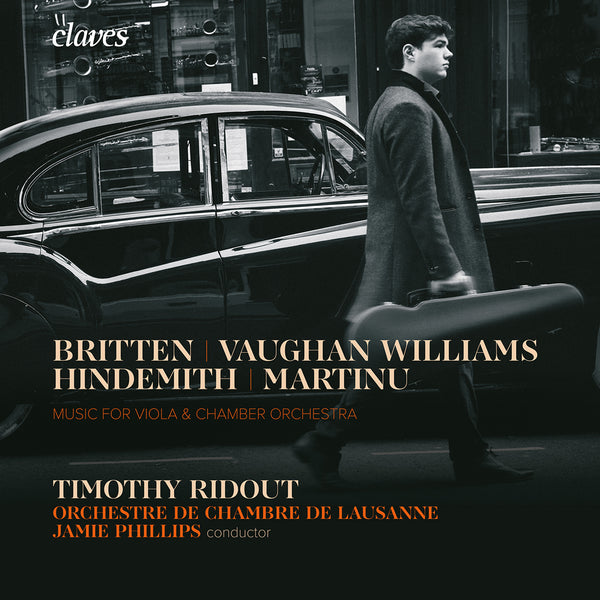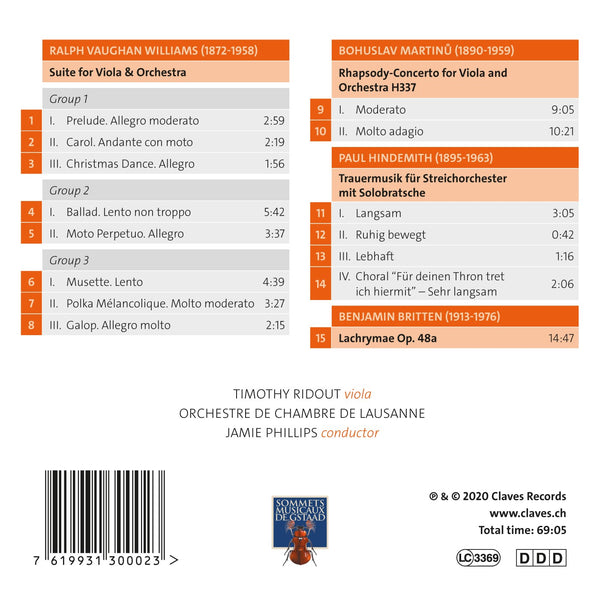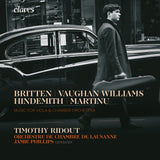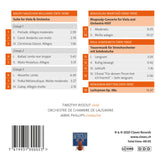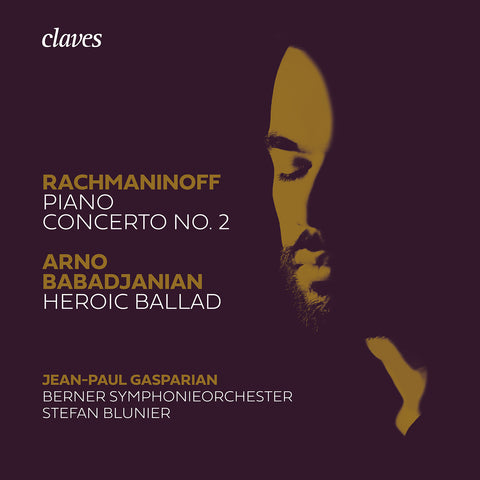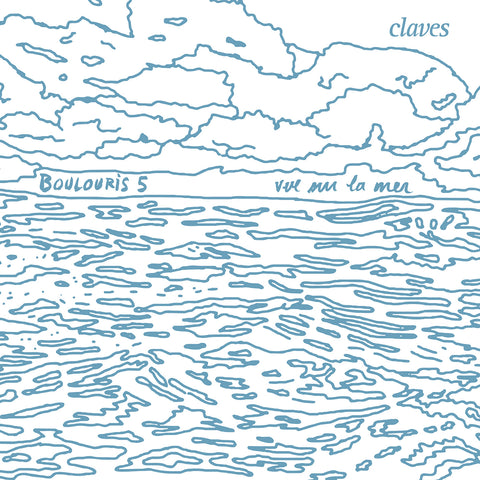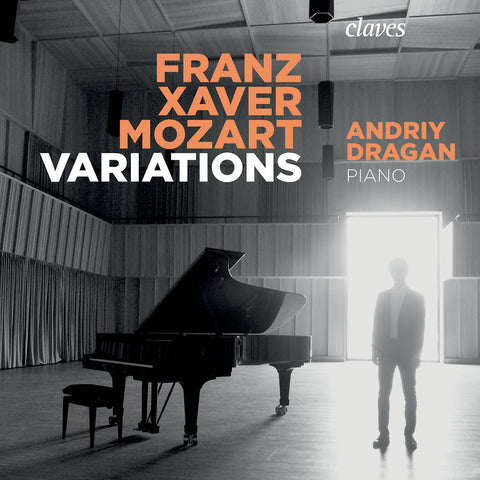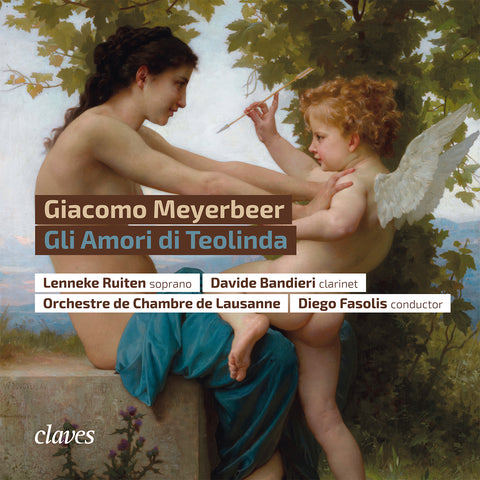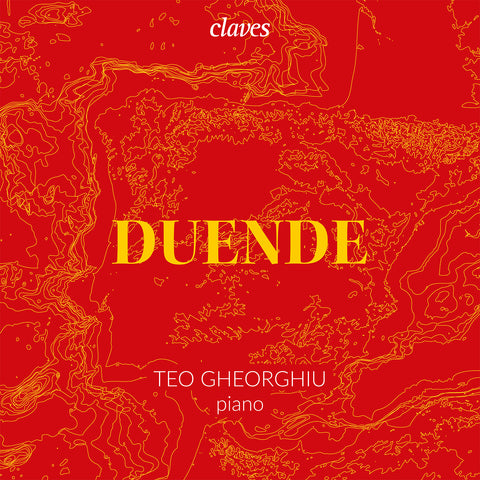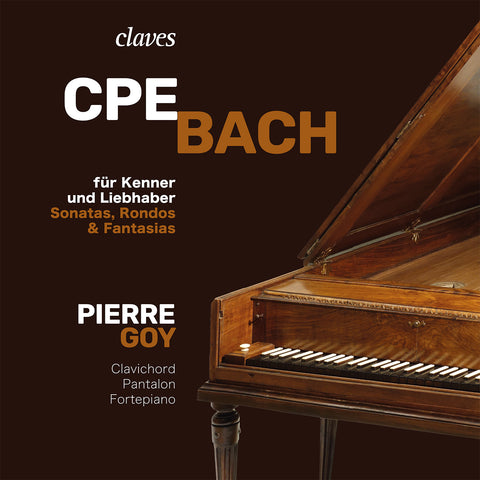(2020) Music for Viola & Chamber Orchestra: Vaughan Williams, Martinu, Hindemith & Britten
Kategorie(n): Kammermusik Orchester Repertoire
Instrument(e): Viola
Hauptkomponist: Ralph Vaughan Williams
Orchester: Orchestre de Chambre de Lausanne
Dirigent: Jamie Phillips
CD-Set: 1
Katalog Nr.:
CD 3000
Freigabe: 28.02.2020
EAN/UPC: 7619931300023
Dieses Album ist jetzt neu aufgelegt worden. Bestellen Sie es jetzt zum Sonderpreis vor.
CHF 18.50
Dieses Album ist nicht mehr auf CD erhältlich.
Dieses Album ist noch nicht veröffentlicht worden. Bestellen Sie es jetzt vor.
CHF 18.50
Dieses Album ist nicht mehr auf CD erhältlich.
CHF 18.50
Inklusive MwSt. für die Schweiz und die EU
Kostenloser Versand
Dieses Album ist nicht mehr auf CD erhältlich.
Inklusive MwSt. für die Schweiz und die EU
Kostenloser Versand
Dieses Album ist jetzt neu aufgelegt worden. Bestellen Sie es jetzt zum Sonderpreis vor.
CHF 18.50
Dieses Album ist nicht mehr auf CD erhältlich.
This album has not been released yet.
Pre-order it at a special price now.
CHF 18.50
Dieses Album ist nicht mehr auf CD erhältlich.
CHF 18.50
Dieses Album ist nicht mehr auf CD erhältlich.
SPOTIFY
(Verbinden Sie sich mit Ihrem Konto und aktualisieren die Seite, um das komplette Album zu hören)
MUSIC FOR VIOLA & CHAMBER ORCHESTRA: VAUGHAN WILLIAMS, MARTINU, HINDEMITH & BRITTEN
Thierry Scherz Prize Sommets Musicaux de Gstaad 2019
The wealth of music composed for the viola in the 20th century almost lets one forget the dearth of it in the 19th, which brought forth only two solo works of note: Hector Berlioz’s Harold in Italy, a concerto commissioned by Paganini that sidelines the viola so much he refused to play it; and Richard Strauss’s Don Quixote, in which the solo viola is relegated to the part of the Don’s sidekick Sancho Panza. Sidelined and sidekicked – the viola’s fate seemed a fulfilment of the oft-quoted line from Quantz’s sometime flute treatise that “the viola is largely regarded among musicians as being of little significance”. It was only really in the 20th century that composers realised that the viola’s status of an in-between instrument could actually be to its advantage. It’s bigger than a violin, but tuned like a cello, and is both warmer in tone than the former, and much more agile than the latter. The viola then had the good fortune to become the preferred instrument of several important composers. Ralph Vaughan Williams (1872-1958) briefly toyed with going professional on it; Paul Hindemith (1895-1963) went the whole hog and made a living from it in the Amar Quartet and as a soloist; and Benjamin Britten (1913-1976) too was a violist, though he kept his public performing activities to the piano and the podium.
The viola was also lucky in having several fine virtuosi in the 20th century, most notably Lionel Tertis (1876- 1975) and William Primrose (1904-1982). Primrose had commissioned Bartók’s (unfinished) Viola Concerto in 1945, and it was for him that Britten wrote his Lachrymae for viola and piano in 1950. This is a series of “reflections”, i.e. variations, on a song by the Elizabethan composer John Dowland entitled “If my complaints could passion move”. The song’s melody is heard in the bass line after a few bars in the first variation, but only becomes properly recognisable at the end of the tenth and last. Meanwhile, another Dowland song has also infiltrated the texture – variation No. 6 refers back to Dowland’s more famous song “Flow my tears”, which had originated in his “Lachrymae pavan” – hence Britten’s title. He composed it during a break in work on his opera Billy Budd, and gave the first performance with Primrose at the Aldeburgh Festival in 1950. Britten then scored the work for viola solo and string orchestra in the spring of 1976, just months before he died.
Chris Walton
***
TIMOTHY RIDOUT
Selected as a BBC New Generation Artist in 2019, Timothy is one of the most sought after violists of his generation.
This season Timothy appears as soloist with the Orchestre de Lille, Salzburg Camerata, Philharmonia Orchestra, Chamber Orchestra of Europe, Tapiola Sinfonietta, Orchestre National Bordeaux, Aachen Symphony, BBC Symphony and Siberian State Symphony Orchestras. He records for the Harmonia Mundi Nova series and with l’Orchestre de Chambre de Lausanne for Claves Records.
Other highlights include recitals at Wigmore Hall, Auditorium du Louvre and the Lucerne Festival. He takes part in the Lockenhaus, Heimbach and Kronberg Festivals, collaborating with Isabel Faust, Janine Jansen, Kian Soltani, Benjamin Grosvenor, Lars Vogt, Nicolas Altstaedt and Christian Tetzlaff, among many others. Further afield he returns to Japan and joins the Marlboro Academy in the USA on the invitation of Mitsuko Uchida.
Over the last year Timothy has made his debut with the Hamburg Symphony Orchestra, undertaken a residency with Baden-Baden Philharmonie, and performed the Walton Concerto with the Tonhalle Orchestra Zurich under the auspices of the Orpheum Foundation. He has worked with conductors including Christoph Eschenbach, David Zinman, Gabor Takács-Nagy, Sylvain Cambrelling, Jamie Phillips and Sir Andras Schiff.
In 2016 Timothy won 1st Prize in the Lionel Tertis Competition and was selected by Young Classical Artists Trust (YCAT). Other prizes include the 2019 Thierry Scherz Award at the Sommets Musicaux de Gstaad and 1st Prize at the 2014 Cecil Aronowitz Competition.
Born in London, Timothy studied at the Royal Academy of Music and the Kronberg Academy with Nobuko Imai.
Timothy plays on a viola by Peregrino di Zanetto c.1565-75 generously on loan from Beare’s International Violin Society.
***
THIERRY SCHERZ PRIZE
Sponsored by the Pro Scientia et Arte Foundation and the Friends of the Sommets Musicaux de Gstaad
One of the main goals of the Sommets Musicaux de Gstaad has always been to give young talents a chance, to help and guide them, reason for which, from the very start, the festival included into its programme a series of concerts given in the Gstaad chapel by promising young musicians of different nationalities playing the same instrument.
Every year, this Prize aims to reward one of these young musicians with the opportunity of recording a CD with an orchestra, produced by Claves Records, ensuring a wide distribution.
This Prize gives the laureate experience with microphones, collaboration with a conductor, with orchestra musicians, an artistic director, sound engineers… and finally the joy of an extensive distribution.
Our laureates’ success reminds us of the importance of supporting a promising career in its early days. We offer our sincere thanks to our sponsors who enable us to continue in this direction.
The Thierry Scherz Prize is an homage to the co-founder and artistic director of the Festival.
2019 Prize: Timothy Ridout, viola
***
PAST WINNERS
2018
Anastasia Kobekina, cello
2017
Caroline Goulding, violin
2016
Kevin Jansson, piano
Guillaume Bellom, piano
2015
Anaïs Gaudemard, harp
2014
Bizjak Piano Duo
2013
Pablo Ferrández, cello
2012
Soo-Hyun Park, violin
2011
Sophie Pacini, piano
2009
Berolina Piano Trio
2008
Nicolas Altstaedt, cello
2007
Alexandra Soumm, violin
2006
Joseph Moog, piano
2005
Emmanuel Ceysson, harp
2003
Herman Wallén, baritone
2002
Liviu Prunaru, violin
(Find more on the Sommets Musical's site)
— Claves Records (@clavesrecords) October 21, 2021
(2020) Music for Viola & Chamber Orchestra: Vaughan Williams, Martinu, Hindemith & Britten - CD 3000
Thierry Scherz Prize Sommets Musicaux de Gstaad 2019
The wealth of music composed for the viola in the 20th century almost lets one forget the dearth of it in the 19th, which brought forth only two solo works of note: Hector Berlioz’s Harold in Italy, a concerto commissioned by Paganini that sidelines the viola so much he refused to play it; and Richard Strauss’s Don Quixote, in which the solo viola is relegated to the part of the Don’s sidekick Sancho Panza. Sidelined and sidekicked – the viola’s fate seemed a fulfilment of the oft-quoted line from Quantz’s sometime flute treatise that “the viola is largely regarded among musicians as being of little significance”. It was only really in the 20th century that composers realised that the viola’s status of an in-between instrument could actually be to its advantage. It’s bigger than a violin, but tuned like a cello, and is both warmer in tone than the former, and much more agile than the latter. The viola then had the good fortune to become the preferred instrument of several important composers. Ralph Vaughan Williams (1872-1958) briefly toyed with going professional on it; Paul Hindemith (1895-1963) went the whole hog and made a living from it in the Amar Quartet and as a soloist; and Benjamin Britten (1913-1976) too was a violist, though he kept his public performing activities to the piano and the podium.
The viola was also lucky in having several fine virtuosi in the 20th century, most notably Lionel Tertis (1876- 1975) and William Primrose (1904-1982). Primrose had commissioned Bartók’s (unfinished) Viola Concerto in 1945, and it was for him that Britten wrote his Lachrymae for viola and piano in 1950. This is a series of “reflections”, i.e. variations, on a song by the Elizabethan composer John Dowland entitled “If my complaints could passion move”. The song’s melody is heard in the bass line after a few bars in the first variation, but only becomes properly recognisable at the end of the tenth and last. Meanwhile, another Dowland song has also infiltrated the texture – variation No. 6 refers back to Dowland’s more famous song “Flow my tears”, which had originated in his “Lachrymae pavan” – hence Britten’s title. He composed it during a break in work on his opera Billy Budd, and gave the first performance with Primrose at the Aldeburgh Festival in 1950. Britten then scored the work for viola solo and string orchestra in the spring of 1976, just months before he died.
Chris Walton
***
TIMOTHY RIDOUT
Selected as a BBC New Generation Artist in 2019, Timothy is one of the most sought after violists of his generation.
This season Timothy appears as soloist with the Orchestre de Lille, Salzburg Camerata, Philharmonia Orchestra, Chamber Orchestra of Europe, Tapiola Sinfonietta, Orchestre National Bordeaux, Aachen Symphony, BBC Symphony and Siberian State Symphony Orchestras. He records for the Harmonia Mundi Nova series and with l’Orchestre de Chambre de Lausanne for Claves Records.
Other highlights include recitals at Wigmore Hall, Auditorium du Louvre and the Lucerne Festival. He takes part in the Lockenhaus, Heimbach and Kronberg Festivals, collaborating with Isabel Faust, Janine Jansen, Kian Soltani, Benjamin Grosvenor, Lars Vogt, Nicolas Altstaedt and Christian Tetzlaff, among many others. Further afield he returns to Japan and joins the Marlboro Academy in the USA on the invitation of Mitsuko Uchida.
Over the last year Timothy has made his debut with the Hamburg Symphony Orchestra, undertaken a residency with Baden-Baden Philharmonie, and performed the Walton Concerto with the Tonhalle Orchestra Zurich under the auspices of the Orpheum Foundation. He has worked with conductors including Christoph Eschenbach, David Zinman, Gabor Takács-Nagy, Sylvain Cambrelling, Jamie Phillips and Sir Andras Schiff.
In 2016 Timothy won 1st Prize in the Lionel Tertis Competition and was selected by Young Classical Artists Trust (YCAT). Other prizes include the 2019 Thierry Scherz Award at the Sommets Musicaux de Gstaad and 1st Prize at the 2014 Cecil Aronowitz Competition.
Born in London, Timothy studied at the Royal Academy of Music and the Kronberg Academy with Nobuko Imai.
Timothy plays on a viola by Peregrino di Zanetto c.1565-75 generously on loan from Beare’s International Violin Society.
***
THIERRY SCHERZ PRIZE
Sponsored by the Pro Scientia et Arte Foundation and the Friends of the Sommets Musicaux de Gstaad
One of the main goals of the Sommets Musicaux de Gstaad has always been to give young talents a chance, to help and guide them, reason for which, from the very start, the festival included into its programme a series of concerts given in the Gstaad chapel by promising young musicians of different nationalities playing the same instrument.
Every year, this Prize aims to reward one of these young musicians with the opportunity of recording a CD with an orchestra, produced by Claves Records, ensuring a wide distribution.
This Prize gives the laureate experience with microphones, collaboration with a conductor, with orchestra musicians, an artistic director, sound engineers… and finally the joy of an extensive distribution.
Our laureates’ success reminds us of the importance of supporting a promising career in its early days. We offer our sincere thanks to our sponsors who enable us to continue in this direction.
The Thierry Scherz Prize is an homage to the co-founder and artistic director of the Festival.
2019 Prize: Timothy Ridout, viola
***
PAST WINNERS
2018
Anastasia Kobekina, cello
2017
Caroline Goulding, violin
2016
Kevin Jansson, piano
Guillaume Bellom, piano
2015
Anaïs Gaudemard, harp
2014
Bizjak Piano Duo
2013
Pablo Ferrández, cello
2012
Soo-Hyun Park, violin
2011
Sophie Pacini, piano
2009
Berolina Piano Trio
2008
Nicolas Altstaedt, cello
2007
Alexandra Soumm, violin
2006
Joseph Moog, piano
2005
Emmanuel Ceysson, harp
2003
Herman Wallén, baritone
2002
Liviu Prunaru, violin
(Find more on the Sommets Musical's site)
— Claves Records (@clavesrecords) October 21, 2021
Return to the album | Read the booklet | Composer(s): Ralph Vaughan Williams | Main Artist: Timothy Ridout





STUDIO-MASTER (HOCHAUFLÖSENDES AUDIO)
Alle Alben
Amethys Design
Auf Lager
Benjamin Britten (1913-1936)
Bohuslav Martinu
Claves picks
High-resolution audio - Studio master quality
ICMA 2021 nominees
Jamie Phillips
Kammermusik
Orchester
Orchestre de Chambre de Lausanne (OCL)
Paul Hindemith (1895-1963)
Populäre Alben
Ralph Vaughan Williams
Repertoire
Sommets musicaux de Gstaad (SMG)
Timothy Ridout
Viola
Alle Alben
Amethys Design
Auf Lager
Benjamin Britten (1913-1936)
Bohuslav Martinu
Claves picks
High-resolution audio - Studio master quality
ICMA 2021 nominees
Jamie Phillips
Kammermusik
Orchester
Orchestre de Chambre de Lausanne (OCL)
Paul Hindemith (1895-1963)
Populäre Alben
Ralph Vaughan Williams
Repertoire
Sommets musicaux de Gstaad (SMG)
Timothy Ridout
Viola











